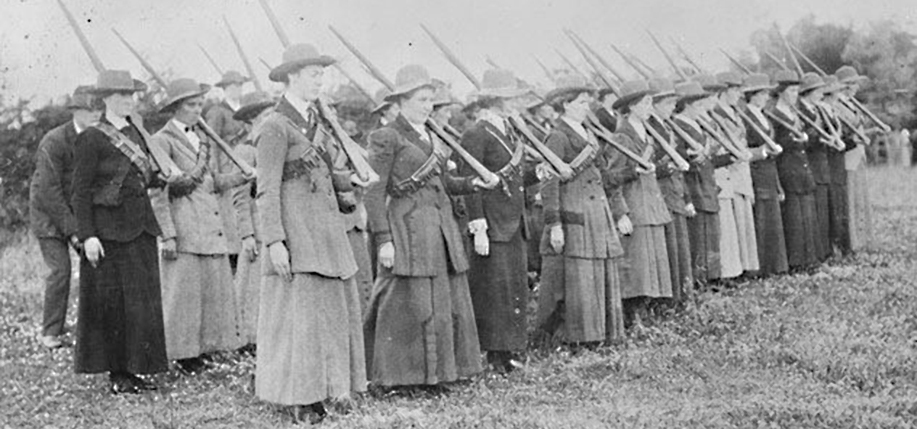A laudable feature of this year’s Easter Rising commemorations is the conscientious effort to recognize the role women played in the insurrection for independence. Books, articles, and documentaries present the distaff side of history, creating (if you will) the “her” story of 1916.
Current attention, however, doesn’t mean that members of Cumann na mBan and like-minded women were invisible in contemporary accounts. Pistol brandishing Countess Markievicz figured prominently in early reportage, and one account of her capture noted that she “kissed her revolver before surrendering it and her cartridge bandolier.”
Moira Regan isn’t a household name for her involvement in the Rising. Yet her detailed description of what it was like to serve in the General Post Office and to move around Dublin throughout Easter Week remains a compelling record from a woman’s point of view.
Regan was interviewed by Joyce Kilmer a few months after the April Rising and May executions, with her own words encompassing 39 paragraphs of a 43-paragraph article in the New York Times Magazine for August 20. A prominent poet – Kilmer’s lyric “Trees” took root in 1913 as an American favorite – he supported himself and his family by writing journalism, mainly for the Sunday magazine of the Times.
Headlined “Irish Girl Rebel Tells of Dublin Fighting,” Kilmer describes his subject and sets the scene before presenting her narrative. The “slight, gray-eyed girl” has “a charming flavor of County Wexford in her manner and in her voice.”
The mood, though, quickly changes: “But back of her gray eyes and charming manner there is a depth of tragic experience. For Moira Regan has worked night and day in a beleaguered fort, has breathed air redolent with gunpowder, and heard the groans of men torn by shot and shell. She has seen her friends led away to death, their bodies to be thrown into a pit of quicklime.”
A few sentences later, the woman – “now living in New York” – begins to tell her story with an emphasis on the day-by-day sequence of events and her judgments of what Kilmer refers to as the “brief but great adventure.”
After she concludes her factual description, noting the involvement of women, Regan interjects her opinions to round out what happened. There’s eloquence throughout her assessment:
“One thing that would strike you about the conduct of the rebels was the absolute equality of the men and women. The women did first-aid work and cooking, and some of them used their rifles to good advantage. They just did the work that was before them, and they were of the greatest moral aid.
“About eighty women were taken prisoner and thrown into cells in Kilmainham Jail. There were no jail matrons; there was no one in charge of them but soldiers, who took every opportunity to insult them. They were not allowed to leave their cells for any purpose for two days. They were treated just as the men prisoners were treated. The women slept over the yard while the men were shot. They would be awakened in the morning by the sound of the quick march, the brusque command, and the sound of the rifles.”
This survivor’s final words assume a power transcending the time when they were originally spoken. A century ago, Moira Regan already understood the Rising’s meaning and significance.
“We have been living in a country that had no national life,” she noted. “And suddenly we were shown that we had a national life – that we were a nation, a persecuted and crushed nation, but, nevertheless, a nation.
“You cannot understand the joy of this feeling unless you have lived in a nation whose spirit had been crushed and then suddenly revived. I felt that evening, when I saw the Irish flag floating over the Post Office in O’Connell Street, that this was a thing worth living and dying for. I was absolutely intoxicated and carried away with joy and pride in knowing that I had a nation. This feeling has spread all over Ireland; it has remained and it is growing stronger. We were a province, and now we are a nation; we were British subjects, and now we are Irish.”
Conducting research about Kilmer and American press coverage of Easter 1916, I discovered that this remarkable interview surreptitiously made its way back to Ireland and was published there. Shortly afterwards the press censor in Dublin (established by the British in early June) became enraged and threatened to shut down the Irish newspapers involved.
Moira Regan’s story brought a woman’s voice, one of experience and insight, into the conversation about the Rising. What she said back then – with emotions still raw and embers still warm – makes a reader, even today, see the bloody struggle for Irish independence in human terms that are imbued with hope. ♦
_______________
Robert Schmuhl is the Walter H. Annenberg-Edmund P. Joyce Chair in American Studies and Journalism at the University of Notre Dame and the author of Ireland’s Exiled Children: America and the Easter Rising (Oxford University Press).


Leave a Reply